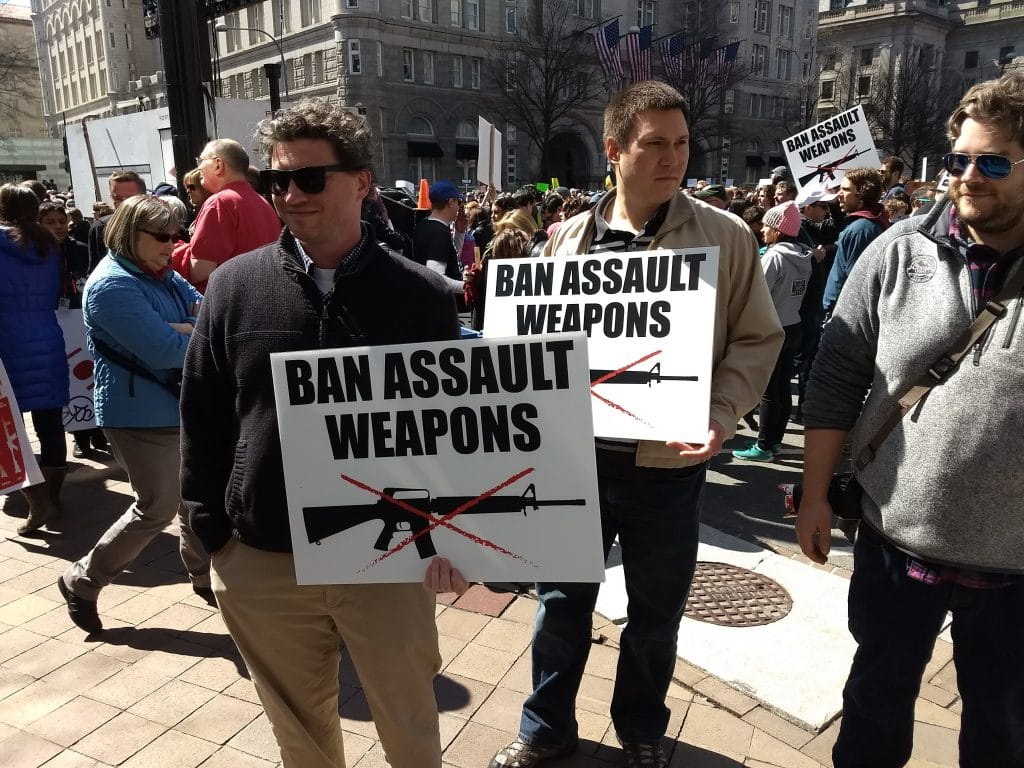One of the last Jim Crow-era gun laws is on the chopping block… again. But can repeal make it to the finish line?
North Carolina Republicans are pushing to eliminate the state’s pistol-purchase permit. They did the same thing back in 2021, but a veto from Governor Roy Cooper (D.) stopped the effort. Now, they’re back at it but with bigger majorities in each chamber of the legislature.
The repeal effort needs just one Democrat to get over the line. Contributing Writer Jake Fogleman examines how likely that is.
Then I take a look at the way Brady United encouraged the parents of an Aurora theater shooting victim to file a meritless lawsuit against ammo dealers and left them holding the bag when the bill came due. I explain why what the group did was highly unethical even if they did make some kind of effort to explain the risks to the couple beforehand, as the group has claimed.
Plus, gun-rights lawyer Kostas Moros joins the podcast to discuss why including suicides in gun violence counts is misleading.

Analysis: Pistol Purchase Permit Repeal is Making its Way Through North Carolina’s Legislature. Is it Doomed Again? [Member Exclusive]
By Jake Fogleman
A bill to repeal North Carolina’s Jim Crow-era pistol-purchase-permit law is once again making its way through the state assembly. Despite serious Republican gains in the last election, the bill still faces an uphill battle to make it into law.
On Wednesday, the North Carolina House of Representatives passed House Bill 50 on a 68-47 party-line vote. That follows last week’s vote in the state Senate, where lawmakers passed Senate Bill 41, which included purchase permit repeal. Because the repeal provisions are in two separate pieces of legislation, the chambers must negotiate a reconciliation bill before the measure can clear the legislature. With strong Republican majorities in both chambers, that is almost certain to happen.
But once it does, the bill still faces a serious roadblock: Democratic Governor Roy Cooper. He vetoed similar legislation back in August 2021.
“Gun permit laws reduce gun homicides and suicides and reduce the availability of guns for criminal activity,” Cooper said in a press release when he vetoed the bill. “At a time of rising gun violence, we cannot afford to repeal a system that works to save lives. The legislature should focus on combating gun violence instead of making it easier for guns to end up in the wrong hands.”
While he has not commented publicly on the latest legislative push to repeal the permit-to-purchase requirement, there isn’t much reason to believe he is any less opposed to the policy now than he was then.
However, some significant changes in North Carolina politics since 2021 could make Cooper’s opposition less relevant. What were once narrow majorities for Republicans in the legislature have significantly expanded. Republicans now hold a veto-proof majority in the Senate and are just one vote away from the same in the House. That means any potential Cooper veto stands a chance of being overridden by Republicans in the legislature so long as they can flip one Democrat.
That’s not an unthinkable task.
The state assembly contains Democrats who vote for pro-gun legislation from time to time. In fact, the 2021 bill to repeal the handgun permit-to-purchase requirement passed with two Democratic House members supporting it. Likewise, a proposal this session to allow permit holders to carry concealed firearms while attending religious services taking place on school property cleared the state House with the support of six Democrats. That’s despite Cooper vetoing a similar church-carry measure in 2021 alongside the permit-to-purchase repeal.
But the hill is steep for supporters of the repeal. After all, voting to help pass a bill that would clear the chamber with or without your vote is an entirely different proposition from voting to override a veto issued by a member of your own party. Republicans couldn’t get anyone to take the easier first vote; getting them to take the second harder vote will be an even taller task.
This is especially true since Governor Cooper is relatively popular. That makes it even harder for House Democrats to stick their neck out and buck the face of their party in the state.
State Representative Michael Wray (D.) is probably the best hope gun-rights advocates have for a veto. He originally signed on as a co-sponsor of House Bill 50 when it was introduced. But he changed his mind and voted against the bill after saying a local sheriff in his district expressed discomfort with the proposal.
That’s not a good sign for repeal supporters. Wray was one of the only Democrats to initially support the measure.
Five representatives were absent from the House vote on the repeal, including one Democrat, so it’s not certain exactly how the vote would have gone had they been present. The absent Democrat, Representative Cecil Brockman, doesn’t mention guns as an issue on his website.
He does, however, represent a safely blue district. So, it’s unlikely repeal advocates can count on his vote.
That leaves few options for the bill’s supporters who hope to gain a lifeline from across the aisle. Barring another change of heart from Representative Wray or some behind-the-scenes horse-trading with another Democrat, it looks as though gun-rights advocates will once again come up short in their quest to repeal the last Jim Crow-era permit-to-purchase law in the south.
Podcast: Should Gun Suicides be Counted as Gun Violence? (Feat. Gun Lawyer Kostas Moros) [Member Early Access]
By Stephen Gutowski
This week, we’re examining the way that most gun-control groups count “gun violence.”
Kostas Moros, a gun-rights lawyer, joins the show to discuss the piece he wrote for The Reload about why the decision to include gun-related suicides in those counts is misleading. He explained that the majority of gun deaths, and usually up to two-thirds of them, are suicides. He said gun-control activists’ claims about the correlation between strict gun laws and lower levels of “gun violence” don’t hold water without including suicides.
Moros argued states with strict gun laws often don’t have lower gun murder rates or overall murder rates than their pro-gun neighbors. He cited his home state of California as a prime example of this phenomenon. Its murder rate is higher than its less restrictive neighbors to the north and only marginally better than Arizona, which has some of the least restrictive gun laws in the country.
Additionally, Moros says treating gun suicides as a type of criminal violence is illogical. He argued no other forms of suicide are referred to as a kind of violence or included in violence counts for knives, rope, or anything else.
He noted that guns are among the most deadly suicide techniques, and gun owners should do everything possible to mitigate the problem. He also noted that the absence or presence of guns at a societal level doesn’t correlate to a country’s suicide rate. The United States has by far the most civilian-owned firearms in the world, but our suicide rate is comparable to most other developed nations and much lower than countries like South Korea.
Plus, Contributing Writer Jake Fogleman and I look at the unethical way Brady United used an Aurora theater victim’s family in a stunt lawsuit that left them bankrupt.
You can listen to the show on your favorite podcasting app or by clicking here. Video of the episode is also available on our YouTube channel. As always, Reload Members get access on Sunday. Everyone else can listen to or watch the show on Monday.
Come on the Podcast
One of the many perks of a Reload membership is the opportunity to appear on the podcast. We’ve had a lot of people on the show from all kinds of backgrounds. It’s one of my favorite segments since it gives us all a better insight into the community that makes this publication possible. If you want to come on the show, just reply to this email and let me know!

Analysis: The Unethical Way Brady Used a Shooting Victim’s Family in a Stunt Lawsuit [Member Exclusive]
By Stephen Gutowski
The parents of an Aurora theater shooting victim felt revictimized after losing a “meritless” case against gun companies, but the gun-control group that backed them is most to blame.
Sandy and Lonnie Phillips, whose daughter Jessica Ghawi was killed in the attack, filed suit in 2014 against the companies from which the shooter bought his ammunition and magazines. Brady United described the case as their own in press releases and provided pro-bono representation for the Phillips. But only Sandy and Lonnie were listed as plaintiffs.
So, when they inevitably lost the case, only the couple was legally on the hook to pay for the defendants’ legal fees. The settlement reached into the hundreds of thousands and bankrupted the couple. Now, they have told a Colorado newspaper they felt Brady didn’t
“We lost three years of our life,” Lonnie Phillips told The Colorado Sun on Tuesday.
Mike Stankiewicz, a Brady spokesperson, repeatedly told The Reload that the group made the Phillips aware of the risks.
“Brady always informs our clients of the financial risks involved in the cases they file, especially when filing in a state like Colorado that has a gun industry special protection law that requires victims who bring about these lawsuits to pay for attorney and other fees when unsuccessful,” Stankiewicz told The Reload. “That was done in this case and in every single other case Brady has litigated on behalf of gun violence victims.”
It’s impossible to know exactly who is telling the truth from the outside. It seems unlikely that the Phillips, who are still advocating for the ability to hold gun companies liable for crimes committed by third parties, are lying about feeling misled. It’s entirely possible that Brady told the couple that losing the case and having to pay legal fees could happen but failed to emphasize just how incredibly likely that was to happen.
But that’s a huge ethical problem in and of itself.
Nobody should have been surprised by the outcome of that case. The fact the couple was caught off guard by their loss or the amount they were liable for is a clear failure on the part of the Brady lawyers who advised them.
This was a symbolic suit with no chance to win and little to no chance it wouldn’t end with a hefty bill for the plaintiffs. The federal Protection of Lawful Commerce in Arms Act (PLCAA) effectively forecloses cases against gun companies over claims they are liable for the criminal acts of third parties. And Colorado law makes it even more likely that plaintiffs will have to cover defendants’ legal costs in such cases.
This legal strategy has been employed by gun-control activists since the 1990s and never won on the merits. It has generated one significant settlement when the insurers of the defunct Remington Arms Corporation agreed to pay families of Sandy Hook victims to end their lawsuit against the company. But even the Conneticuit Supreme Court justices that allowed that case to proceed on its claim, without evidence, about the company’s advertising affecting the shooter said it would be difficult for plaintiffs to win on the merits.
But this case, like most cases seeking to hold gun companies liable for crimes they had no role in committing, wasn’t designed to win. The plaintiffs didn’t offer up any evidence the ammo dealers they sued knew anything about the shooter’s intentions. Nor did they make any specific arguments about how they could have known.
As Federal District Judge Richard P. Matsch put it, the suit was an “all conceivable claims attack on these internet sellers, attempting to destroy their legitimate businesses and invalidate the federal and state statutes protecting them.”
In reality, this case was designed to generate favorable headlines and political pressure. And, frankly, it worked.
MSNBC commentator Rachel Maddow featured the ruling in one of her “outrage-o-meter” segments at the time. Her take mirrored Brady’s own conclusion.
“[T]hey are going to be the first family ever ordered to pay the legal fees under that Colorado statute to the gun industry because they had a daughter who died in one of the worst mass shootings in the history of this country, in the state of Colorado, and they decided to say something about it,” she said.
The fact that Brady declined to help the Phillips cover the cost of the settlement the group helped thrust them into, allegedly because it couldn’t afford to do so, did not make the segment. That matched the general tone of major media coverage of the case.
The recent news that Brady left the Phillips on the hook for the full settlement cost has not generated nearly as much media attention. Even The Colorado Sun, which broke the news, buried it far down in their story. That’s because the Sun’s story focused on the other reason this tactic worked: Colorado is likely to repeal its fee-shifting law.
Now, that’s mainly because Colorado has slowly shifted toward a deeper shade of blue since the case ended back in 2015. Democrats are much more inclined to pass laws intended to help gun-control groups skirt the PLCAA, especially since the Remington settlement. But the Phillips being bankrupted as a result of their Brady-backed symbolic suit undoubtedly had an effect on bringing it up.
That’s not out of the ordinary for political lawsuits, though. Most high-profile political cases aren’t organic creations. They are planned as ways to challenge laws the activists involved don’t like.
That these kinds of liability suits often appear to be designed to burn gun company resources and time rather than winning on the merits of the claim is a significant problem. But the fact that this case was seemingly designed to lose and bankrupt the Phillips without their complete understanding is an even bigger one.
If activists are ok with being forced into bankruptcy by knowingly bringing a protest case they can’t win in order to generate positive news coverage and pressure on legislators, that’s one thing. If they are encouraged into that position without fully understanding the consequences, that’s much worse.

Analysis: Should Gun-Related Suicides be Counted as Gun Violence?
By Konstadinos Moros
It’s impossible to talk honestly about gun-death statistics in America without deciding how to categorize suicides.
Even with the unfortunate recent surge in homicide, suicides still represent most gun-related deaths. In 2020, the most recent year for which the CDC provides data, the US experienced 45,222 gun-related deaths. Of those, 24,292 were suicides compared to 19,384 gun-related homicides. That means suicides comprised 53.7% of gun-related deaths in 2020, with homicides accounting for 42.9%. The remaining balance of about 3.4% is a mix of accidental deaths (535), law enforcement shootings (611), and gun-related deaths of undetermined causes (400).
So, suicide is undoubtedly a huge part of the discussion when it comes to gun-related deaths in America. There is no debate about that.
However, disputes arise when suicide is mixed in with gun homicide, and the total is labeled “gun violence.” All major gun-control advocacy groups count gun violence in this way.
The Violence Policy Center runs a website called “Concealed Carry Killers,” which purports to track “killers” who had concealed carry permits, and it reports 2,240 such cases since 2007. The problem is, according to the website’s own data, over 1,200 of those “killers” were people who succumbed to suicide without harming anyone else. While insulting the memory of these individuals by calling them “killers” may be the most shameful example of the problem with conflating different kinds of gun deaths, it is not uncommon for gun-control advocates to include suicide statistics in their gun violence counts to make a point that homicide data alone does not allow them to make.
Everytown for Gun Safety, the country’s largest gun-control group, recently used the mixed count to make definitive claims about gun control laws and their supposed effect on gun violence.
“We’ve ranked all 50 states on the strength of their gun laws—and compared those rankings with each state’s rate of gun violence,” the group tweeted late last month. “The result is clear: The stronger a state’s gun safety laws, the fewer people die by gun violence.”
Their ranking, of course, depends on counting suicides along with homicides. Their “gun violence rate” is simply a combined total of all gun deaths in each state. If they only compared states by gun-related homicide and excluded suicide, the data would not support their conclusions.
For instance, there is no correlation between a state’s Giffords Gun Control grade and its intentional homicide rate.
Of course, gun suicides remain a vital part of any discussion about gun deaths. But they are not relevant to a conversation about “gun violence” or discussions of gun-control measures
For one, it is entirely misleading to call suicides “gun violence” because that term makes most people think of crimes against other people, not self-harm. Moreover, while the US saw 24,292 gun-related suicides in 2020, it also had another 20,930 suicides that were completed via some other method. Yet no one refers to suicide by hanging as “rope violence,” nor do they call scenarios where someone jumps to their death “bridge violence.” Those phrases would probably strike most as ridiculous, but gun-related suicides are frequently included in gun violence statistics without major media outlets batting an eye.
Additionally, there is some evidence that guns have not dramatically increased the rate of suicide in the United States. While there is no denying that a suicide attempt with a gun is more likely to have a tragically irreversible result than most other methods, OECD data shows the US suicide rate is not abnormal compared to other countries. While the US rate of 14.1 suicides per 100,000 people is undoubtedly on the higher end of the normal range among wealthy countries, it is still within that normal range. Our rate is below that of Japan (14.6), Belgium (15.2), and South Korea (24.1), all countries with far stricter gun laws and far fewer firearms.
Packaging gun suicides with gun homicides as a justification for enacting new gun restrictions is faulty for another reason: only a few gun-control proposals seek to address suicide.
For example, Everytown rates California #1 in the country because it claims that the strength of the state’s gun laws has led to a “gun-violence rate” (i.e., gun-death rate) of 8.5 per 100,000, the lowest in the country. However, California’s gun-related homicide rate is nothing special at around 4.4 per 100,000, only slightly better than its pro-gun neighbor Arizona (5.1 per 100,000) and below that of numerous other pro-gun states. But its suicide rate, the seventh lowest in the country according to the CDC’s 2020 data, leads to its low overall gun-related death rate.
That California has a comparably low suicide rate is commendable, but it likely has little to do with the state’s gun control policies because very few of its laws aim to reduce suicide. Everytown’s website praises California for a number of gun control laws, including universal background checks, restrictive concealed carry permitting, declining to implement a “Stand Your Ground” law, prohibitions on “assault weapons,” regulations of “ghost guns,” restrictions on “high-capacity magazines,” limitations on where guns can be carried, and much more.
But none of those things have any bearing on suicide. Most suicidal people will pass a background check, they don’t need a carry permit to have a gun in the home, and “Stand Your Ground” laws, as well as laws restricting certain rifles or magazines, make it no more difficult for someone to harm themselves.
Of the long list of gun laws that Everytown applauds California for, only three could even conceivably reduce suicide: red flag laws, mental health records reporting requirements, and secure storage requirements. Assuming they work as intended (and I have no data to confirm that they do), red flag laws could theoretically disarm someone who is a danger to themselves. That sort of intervention could conceivably prevent somebody experiencing suicidal ideation from going through with it if they aren’t committed to finding an alternative means. Similarly, mental health record reporting requirements may ensure some suicidal people cannot buy guns. Again, assuming they do not substitute another method, maybe that can prevent someone’s suicide too. Lastly, it is at least conceivable that safe storage laws can stop suicidal individuals in a household from accessing firearms owned by a family member.
So, it should be conceded that a few of the measures Everytown includes appear to have some chance of reducing gun-related suicide.
However, Everytown lists around 40 different gun-control measures that California has enacted, and only a handful can even arguably affect gun-related suicide rates. Suicides make up over half of Everytown’s overall gun violence statistics, but only a small minority of their proposed solutions for gun violence are relevant in any way to gun-related suicide.
Both sides of this debate should embrace transparency in discussing these issues. Certainly, suicide victims deserve that modicum of respect. Suicide prevention is an important priority, and Americans on all sides of the gun issue ought to work toward finding the best ways to reduce the use of guns for that purpose. However, conflating gun suicide with gun violence is a disservice to that cause which only serves to confuse and mislead people.
That’s it for now.
I’ll talk to you all again soon.
Thanks,
Stephen Gutowski
Founder
The Reload







